Mass Strikes in South Korea: The Government calls for Police and Public Prosecutor
South Korea, perhaps, is facing a wave of massive strikes.
Source : BASE21

* Incheon subway workers' union started general strike on June 23th
by Christian / Base21 Media Activists
dvs-b@t-online.de
Part 1
It started last Saturday with the strike of the teachers against NEIS (National Education Information System). In the beginning of the week the subway workers in Incheon, Daegu and Busan went on strike for higher wages, a better safety system for the passengers and the personnel and more personnel to ensure more security. The background of the issue of safety is repeated accidents like in Daegu last February. Here a fire in the subway killed 192 passengers. A member of Minju-nodong dang (Democratic Labor Party) a while after the accident: "Things like that are the direct results of greed for maximum profit. This is nothing else than the ordinary capitalism".
Like in Busan short after the beginning of the strike the two sides reached an agreement to increase workers' pay by five percent, to establish a safety management committee within the corporation and to increase the number of engineering personnel in subway operations. A first victory for the struggling unionists! In Incheon the subway workers were striking until early Saturday.
Meanwhile the South Korean government is confused and react more or less helpless. Sitting between the union and the employers - before the election on one side Roh Moo-hyon promised a worker friendly policy but on the other hand he predicted economic prosperity - it get now pressure from both sides. So now the Prime Minister Goh Kun without further ado called all the strikes political and therefore illegal and with this "knowledge" he feels he has a mission to call now for the police and public prosecutor. In the past situations like now led frequently to the point that the government - in the name of the entrepreneurs - sent the riot police and arrested the strike leaders.
Unimpressed of it the KCTU lively continues to organize further struggle measures. Last Wednesday in twenty cities in South Korea striking workers took the streets to support the demands - "Repeal the 'Export Processing Zone' Act", "Protection of informal workers' rights", "Opposition to the introduction of NEIS" and "Increasing the minimum wage" - by the KCTU. Alone in the South Korean capital thousands of unionists participated, including Hyundai Motors Trade union, Ssanyong Motors Trade union but also hundreds of teachers in the rally and blocked later with a powerful demonstration Jong-no, one of Seoul's most important avenues. Lee Byeong-ju from the Korea Teachers and Educational Workers' Union (KTU): "But this is only the beginning. We'll struggle until the government will comply with our demands." And perhaps he will be right. On Saturday in the early morning the railway workers, organized in the Korean Federation of Transportation, Public & Social Services Workers Unions (KPSU), to go on strike against the privatization of the railroad net.
Part 2: Bloody oppression of the union
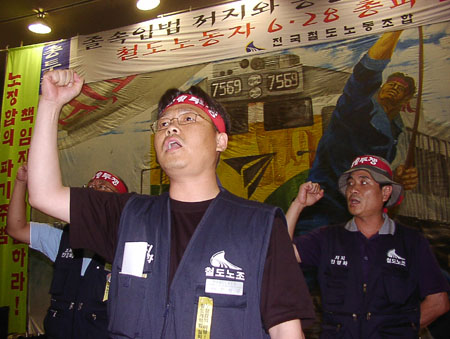
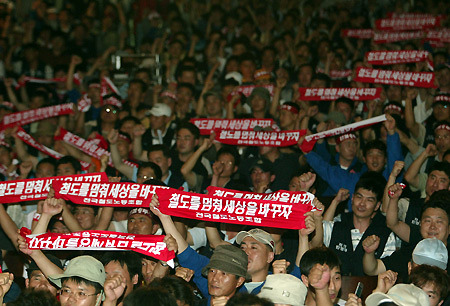
* The eve ceremony for Railroad workers' strike were on going until June 28th, 04:00 am.
The Railway Workers Union said yesterday that it would begin a nationwide strike at 4 a.m. today to protest Seoul's plans to strip railroad workers of civil service benefits. Seoul plans to put the management of the railroad system under a public corporation.
Yesterday in the afternoon in Hoollyeonwon Park downtown Seoul the Railway Workers Union started the struggle with a rally. Even it was heavy raining hundreds of railway workers gathered and strongly they demanded from President Roh not to forget what he was promising before his election: don't touch the public service. But like during the days of the aggression against Iraq - before the election Roh said: "Never I'll support planned unjust war!" - the South Korean government didn't care about the promises from the past.
After the rally unionists and their supporters - mainly students related to Da-hamkke (All Together), Minju-nodong dang (Democratic Labor Party) and Nodongja-ui him (Power of the Working Class) - went to Yonsei University, located in Shinchon area not far away from downtown Seoul. The decision to go into a university has a specific background: universities in South Korea are taboo-zones for the police. Because administration officials said "the threatened strike is illegal and said it would respond with strong measures, including police intervention," South Korean conservative newspaper JoongAng Ilbo wrote today, so the union thought it might be better to make the decision to go on strike or not on a safe place.
The announcing of the voting result was scheduled for 4 am. Until that time several thousand delegates from Railway Workers Union followed an impressive political and cultural program in a great atmosphere. At 4.20 am the result was announced: the union will go on strike until the demands (see the article "Why Korean Railway workers embarked upon a strike?") are fulfilled. The result led to an incredibly cheering.
But two just two hours later there was no reason to cheer anymore, at least not for the workers. What nobody would believe before got reality: the government sent thousands of riot cops. But, like usually, they didn't stop in front of the gates of the Yonsei, instead they stormed the campus. By excessive force they cleared the area and arrested, according to KCTU, 1.700 union activists. Several people were injured, some seriously. After two hours of struggle it was quiet on the campus.
In protest against this measure KCTU called for the afternoon for a rally on Yeouido in front of National Assembly. Several hundred union activists and members of different left organizations followed the call and gathered there. KCTU announced during the rally an unlimited sit-in struggle on the same place until Minister of construction and transportation Choi Jong-chan hasn't resigned and the government meets with the demands of the union. In the case of government's denial KCTU threats with a "strong anti-government struggle", they call in a resolution, and with "combined strikes" next month. Before JoongAng Ilbo reported that Korean Confederation of Trade Unions said it would turn wage negotiation strikes scheduled next month into a demonstration against the government's overall labor policies if the government suppresses the railway union's strikes by force. Because also the planned strikes will be a political the government will punish again the union and, perhaps, it will lead in an escalating situation.
Here
http://cast.jinbo.net/news/show.php?docnbr=28737
http://db.voiceofpeople.org/new/news_view.html?serial=4905&category=type10
you can see more pictures and videos about the "events".
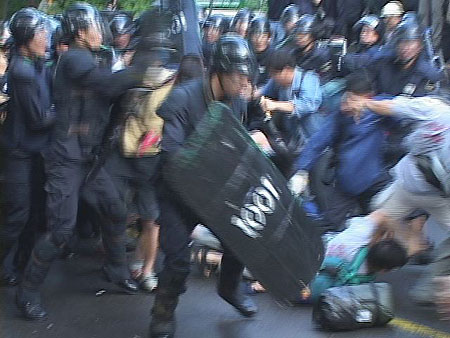
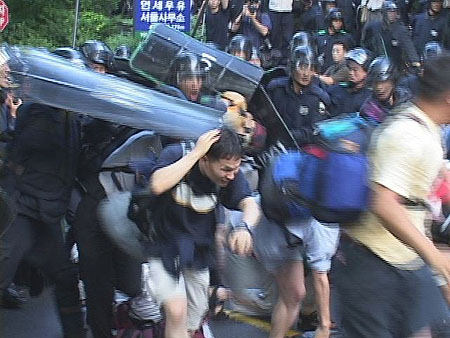
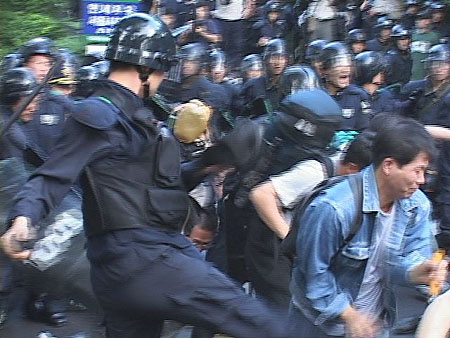
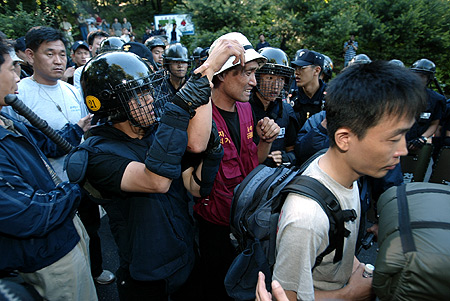
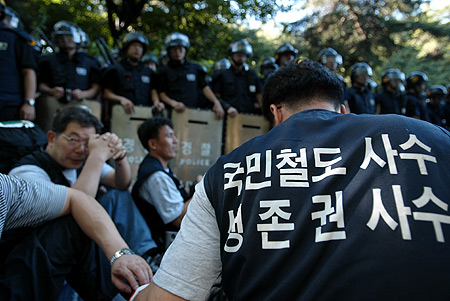
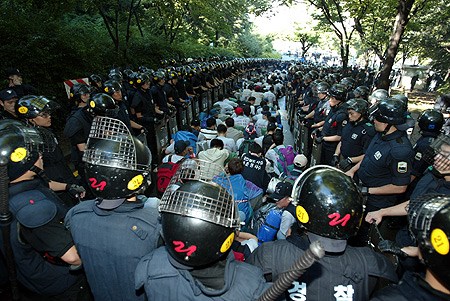 2003 / -0 / 6-
|
























